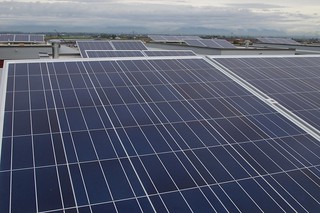Renewable Energy Could Supply Most of BC's Energy Needs
 |
| 23 kW solar array in Delta, BC |
He is correct that electricity is only part of the picture when it comes to BC energy use. King points out that gas and diesel accounts for about 78,000 GWh of energy. But he then incorrectly assumes that if we converted all these vehicles to electric the consumption would be the same. Electric vehicles are about 80% efficient compared to 20% efficiency for internal combustion engines. So if we converted all vehicles to electric it would account for only about 19,000 GWh of electrical consumption.
King comes back to transportation later in the article. He states that the “vast majority of British Colombians can not be served by mass transit.” In fact, over 75% of the population of BC live in municipalities that have a public transit system. The problem is that our transit modal share is abysmal by international standards. For example Zurich, Switzerland has a transit modal share of 65% - more than four times the best example in BC. There is no reason why we can't achieve this type of modal share if we give people good options.
It is also true that we could only achieve this type of transit use in areas of significant population. But almost 70% of BC population lives in just 3 metro areas so focusing on those areas could result in a large dent in private vehicle use. Inter-city electric trains could provide an alternative for another significant portion of trips.
If we use electric public transit it would results in over a 90% savings in energy compared to private vehicle use. Assuming only a 50% modal share (much less than Zurich) and applying it only to the top 3 metro areas of BC we now are down to 13,000 GWh to replace gas and diesel use.
King seems to think that public transit is an expensive option but the evidence suggests otherwise. Research by UBC's Professor Patrick M. Condon and Kari Dow showed that an extensive light rail transit system could be built over much of the lower mainland for the cost of expanding a single bridge to include more light vehicle traffic.
King is correct that panel vans and commercial light trucks could not be replaced by public transit. But we already have a least two companies in Vancouver using 100% electric vans for delivery. In other areas of the world they are using hybrid bio-diesel / electric vans. Bio-deisel can also be used for transport trucks. Fully electric transport trucks are currently being tested in some corridors. And of course fully electric trains are already used for long distance goods transport in some areas of the world.
The article also discusses natural gas use but once again makes a calculation error. About 83,000 GWh of energy is used by natural gas to heat buildings, heat water and for industrial processes. The author seems to assume that if we switch to electricity the consumption would be the same. But it would not. Many natural gas burners are only about 80% efficient. Yes, some new expensive boilers are over 95% efficient but there are also many old boilers in BC that are well below the 80% value.
So, just by switching to electric resistive heaters (which are close to 100% efficient) we would achieve a 20% reduction in energy use. But from an energy perspective this makes no sense when we could switch to heat pumps which are about 300% efficient (efficiencies can even be higher if it is a water or ground source heat pump). So the reduction would be closer to 70%.
This ignores the gains that can be made even before we make the switch to electricity. Energy efficiency engineers regularly are able to achieve 30% reductions in energy use in commercial buildings in BC. One recent example in Vancouver saw a 90% reduction in natural gas use based on a technology that had a payback of less than 5 years.
It also ignores the reductions that could be seen if we adopted a PassivHaus standard for building construction. This standard is widely used in parts of Europe and results in buildings that use 90% less energy for heating than we do here in Canada.
Based on the factors described above we would need less than 33,000 GWh of electricity to replace all the gasoline, diesel and natural gas use in BC. The BC Sustainable Energy Association has estimated that BC could produce 58,000 GWh annually from renewable resources excluding large scale hydro electricity.
Clearly we have the technology to replace the majority of our fossil fuel use with renewable energy. We just need the political will to make it happen.
Comments